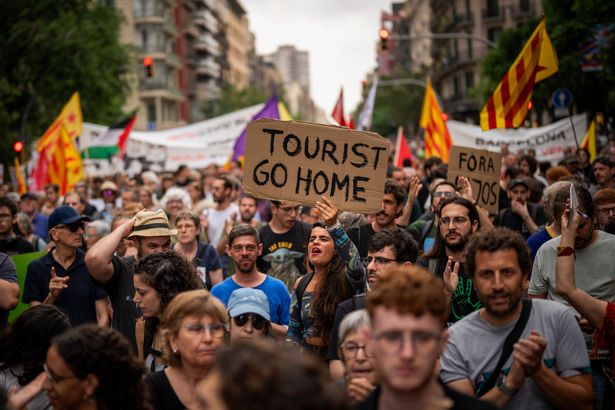PORTLAND, Ore. — One program distributes laptops in rural Iowa. Another helped people get back online after Hurricane Helene washed away computers and phones in western North Carolina. Programs in Oregon and rural Alabama teach older people, including some who have never touched a computer, how to navigate in an increasingly digital world.
It all came crashing down this month when President Trump — on his own digital platform, Truth Social — announced his intention to end the Digital Equity Act, a federal grant program meant to help bridge the digital divide. He branded it as “RACIST and ILLEGAL” and said it amounts to “woke handouts based on race.” He said it was an “ILLEGAL $2.5 BILLION DOLLAR giveaway.” The program was funded with $2.75 billion.
The name seemed innocuous enough when the program was approved by Congress in 2021 as part of a $65-billion investment meant to bring internet access to every home and business in the United States. The broadband program was a key component of the $1-trillion infrastructure law enacted under the Biden administration.
The Digital Equity Act was intended to fill gaps and cover unmet needs that surfaced during the massive broadband rollout. It gave states and tribes flexibility to deliver high-speed internet access to families that could not afford it, computers to kids who did not have them, telehealth access to older adults in rural areas, and training and job skills to veterans.
Whether Trump has the legal authority to end the program remains unknown. But for now the Republican administration can simply stop spending the money.
“I just felt my heart break for what we were finally, finally in this country, going to address, the digital divide,” said Angela Siefer, executive director of the National Digital Inclusion Alliance, a nonprofit that was awarded — but has not received — a $25.7-million grant to work with groups across the country to help provide access to technology. “The digital divide is not just physical access to the internet, it is being able to use that to do what you need to do.”
The word ‘equity’
While the name of the program probably got it targeted — the Trump administration has been aggressively scrubbing the government of programs that promote diversity, equity or inclusion — the Digital Equity Act was supposed to be broader in scope.
Though Trump called it racist, the words “race” or “racial” appear just twice in the law’s text: once, alongside “color, religion, national origin, sex, gender identity, sexual orientation, age, or disability,” in a passage stating that no groups should be excluded from funding; and later, in a list of covered populations, along with older adults, veterans, people with disabilities, English learners, people with low literacy levels and rural Americans.
“Digital Equity passed with overwhelming bipartisan support,” Democratic Sen. Patty Murray of Washington, the act’s chief proponent, noted in a statement. “And that’s because my Republican colleagues have heard the same stories as I have — like kids in rural communities forced to drive to McDonalds parking lots for Wi-Fi to do their homework.
“It is insane — absolutely nuts — that Trump is blocking resources to help make sure kids in rural school districts can get hot spots or laptops, all because he doesn’t like the word equity!”
The National Telecommunications and Information Administration, which administers the program, declined to comment. It’s not clear how much of the $2.75 billion has been awarded, though in March 2024 the NTIA announced the allocation of $811 million to states, territories and tribes.
‘More confident’
On a recent morning in Portland, Ore., Brandon Dorn was among those taking a keyboard basics class offered by Free Geek, a nonprofit that provides free courses to help people learn to use computers. The class was offered at a low-income housing building to make it accessible for residents.
Dorn and the others were given laptops and shown the different functions of keys: control, shift and caps lock, how to copy and paste. They played a typing game that taught finger and key placement on a color-coded keyboard.
Dorn, 63, said the classes helped because “in this day and age, everything has to go through the computer.” He said it helped him feel more confident and less dependent on his children or grandchildren to do things such as making appointments online.
“Folks my age, we didn’t get this luxury because we were too busy working, raising the family,” he said. “So this is a great way to help us help ourselves.”
Juan Muro, Free Geek’s executive director, said participants get the tools and skills they need to access things like online banking, job applications, online education programs and telehealth. He said Trump’s move to end funding has put nonprofits such as Free Geek in a precarious position, forcing them to make up the difference through fundraising and “beg for money to just provide individuals with essential stuff.”
Sara Nichols works for the Land of Sky Regional Council, a multi-county planning and development organization in western North Carolina. On the Friday before Trump’s inauguration in January, the organization received notice that it was approved for a grant. But like other groups the Associated Press contacted, it has not seen any money.
Land of Sky had spent a lot of resources helping people recover from last year’s storms. The award notice, Nichols said, came as “incredible news.”
“But between this and the state losing, getting their letters terminated, we feel just, like, stuck. What are we going to do? How are we going to move forward? How are we going to let our communities continue to fall behind?”
Filling unmet needs
More than one-fifth of Americans do not have broadband internet access at home, according to the Pew Research Center. In rural communities, the number jumps to 27%.
Beyond giving people access to technology and fast internet, many programs funded by the Digital Equity Act sought to provide “digital navigators” — human helpers to guide people new to the online world.
“In the United States we do not have a consistent source of funding to help individuals get online, understand how to be safe online and how to use that technology to accomplish all the things that are required now as part of life that are online,” said Siefer of the National Digital Inclusion Alliance. This includes providing families with internet hot spots so they can get online at home and helping seniors avoid online scams, she said.
“Health, workforce, education, jobs, everything, right?” Siefer said. “This law was going to be the start for the U.S. to figure out this issue. It’s a new issue in the big scheme of things, because now technology is no longer a nice-to-have. You have to have the internet and you have to know how to use the technology just to survive, let alone to thrive today.”
Siefer said the word “equity” in the name probably prompted Trump to target the program for elimination.
“But it means that he didn’t actually look at what this program does,” she said. “Because who doesn’t want Grandma to be safe online? Who doesn’t want a veteran to be able to talk to their doctor rather than get in a car and drive two hours? Who doesn’t want students to be able to do their homework?”
Ortutay and Rush write for the Associated Press and reported from San Francisco and Portland, Ore., respectively.







